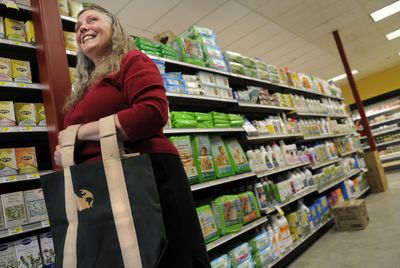Going green is in the bag
Blanchard resident’s cloth bags handy during grocery shopping

When it comes to trends, Blanchard resident Jeanne Bruner is way ahead of her time. While going green is something relatively new to many in the community, for Bruner it began decades ago.
”It all started in the ’70s with me,” said Bruner. “Since then I’ve always used cloth bags in the store.” Now she is helping others be more environmentally conscious.
She has invented a cloth shopping bag, called Jeanne’s Green Bags, which are designed to be used with retail bagging racks and carousels.
“It makes it a lot easier to use a cloth bag,” said Bruner. “The checkers love them.”
The bags have an innovative handle design which makes it easier to hold the bag open and secures it on the retail bagging rack. The wide handles that encircle the bag provide more comfort to one’s hands and provide added strength as well.
With a patent pending, there have been 500 manufactured and Bruner said she has approximately 200 left. “That’s a pretty good start,” said Bruner.
The mother of five and grandmother of six, Bruner began by giving 50 people, some of whom she knew and some she did not, a bag and asking for their feedback.
“It was 100 percent satisfaction,” said Bruner.
Bruner said witnessing the extremely high number of petroleum-based plastic bags, bottles and packaging that clogs the landfills, oceans and roadways inspired her. Furthermore, she said, only three percent of plastic bags are recycled. She began the process of marketing her invention in May 2007 and used Legal Zoom to assist her with all the paperwork necessary to get a patent.
“It’s been a long process but an exciting one too,” said Bruner.
The bags are manufactured in the United States and are 100 percent cotton, both of which were important to Bruner. They hold approximately two to three shopping bags worth of groceries and can hold up to 50 pounds. According to Bruner, the average family uses six to 10 plastic bags each time they go to the store. And while she realizes not everyone may go to the lengths she does to be environmentally conscious, she said that not using plastic shopping bags is a good first step.
“Using a cloth shopping bag is the one thing that everyone can do to contribute to the environment,” said Bruner.
Some of the things that Bruner and her family do include saving containers to reuse them and using glass jars to store food. She also washes and reuses the plastic bags in which produce is put in in the stores. On her Web site www.jeannesgreenthings.com she has information to let people know what they can do to recycle and help the environment, including using environmentally friendly cleaning products, composting fruit and vegetable scraps, buying in bulk to reduce packaging and drinking only tap water so not to use plastic water bottles.
“People can buy filters for their tap water if they want to ensure they are getting good, clean water,” said Bruner.
Other things Bruner and her family do include planting an organic garden and taking their own cup if they are getting something to drink from a store.
Making people aware is a big step and one that Bruner says is necessary to the whole process of encouraging people to practice being more environmentally friendly.
While manufacturing overseas is significantly less expensive, Bruner said it was important to her to have her bags manufactured in the United States. “It keeps the economy here at home working,” she said.
Education and leading by example are just some of the ways that Bruner is helping people take that first step to becoming more environmentally conscious.
“We all need to be thinking about it. We don’t want to leave a mess for our children and grandchildren,” said Bruner.